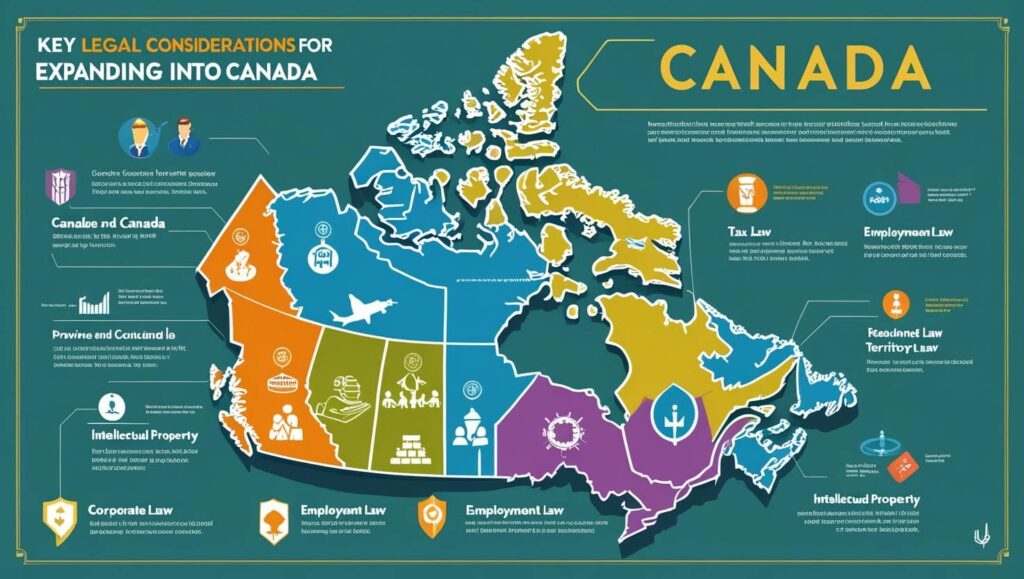Understanding Canada’s Legal Environment
Canada’s legal and regulatory framework is shaped by both federal and provincial governments. While laws may vary across provinces and territories, many legal standards especially in areas such as corporate formation, employment, and taxation are harmonized or highly similar (except in Quebec, which follows a civil law system).
Privacy regulation is primarily governed by federal law, though some provinces maintain additional requirements. Taxation includes both federal and provincial components, such as the Goods and Services Tax (GST) and Provincial Sales Tax (PST), or a combined Harmonized Sales Tax (HST) in certain jurisdictions.
When it comes to corporate tax, the determining factor isn’t the province of incorporation, but rather the location of a “permanent establishment” essentially, where the company conducts business operations.

Incorporating a Canadian Business
Setting up a Canadian company is efficient and straightforward. In most cases, incorporation can be completed within 24 hours of receiving the necessary information. All documentation can be submitted electronically, and no in-person presence or notarization is required making this process especially friendly to international entrepreneurs.
Provinces such as Ontario, Alberta, and British Columbia have eliminated the requirement for a Canadian-resident director, removing a common obstacle for non-resident founders.
Unlike the U.S., where entrepreneurs must choose among LLCs, C Corps, and S Corps, most Canadian jurisdictions offer a single structure: the standard limited liability corporation. Some provinces, however, allow the creation of Unlimited Liability Corporations (ULCs), which may be advantageous for U.S. companies seeking specific tax treatment.
Incorporating a Canadian company can also open access to Scientific Research and Experimental Development (SR&ED) tax credits, which are generally restricted to Canadian-controlled corporations.
Employment Law: What You Need to Know
Canadian employment law differs significantly from U.S. norms. Most notably, “at-will” employment does not exist in Canada. Employers must use clearly worded, compliant contracts that define the scope of employment and limit post-termination liabilities. Our firm provides well-drafted employment agreements to help businesses mitigate risk and comply with provincial standards.
Understanding worker classifications is also key. Canadian law distinguishes between:
- Employees
- Dependent Contractors
- Independent Contractors
Employees and dependent contractors are entitled to more legal protections especially around termination, overtime, and holiday pay. Misclassifying workers can lead to costly liabilities. Courts and tribunals may “deem” an individual to be an employee despite being labeled otherwise by the company, exposing the business to back pay and wrongful dismissal claims.
Properly crafted employment contracts should address:
- Termination notice or severance pay
- Intellectual property rights
- Post-employment obligations (e.g., non-solicitation and return of property clauses)
Non-compete clauses are now restricted or banned in certain provinces, making legal review even more critical.
Localizing Legal Agreements
International businesses entering the Canadian market often need to adjust their existing contracts to align with Canadian law. This can involve updates to:
- Warranties
- Intellectual property clauses
- Privacy policies
- Indemnity provisions
Even minor variations in terminology or legal assumptions can result in serious enforceability issues in Canada. We regularly assist clients in “Canadianizing” their agreements to ensure compliance and reduce risk.
Sector-Specific Regulations
Certain industries in Canada are subject to more stringent regulation, including:
- Banking and finance
- Broadcasting and telecom
- Transportation and logistics
- Mining, energy, and natural resources
- Food and pharmaceuticals
Navigating permits and licensing requirements in these areas is essential. We guide our clients through regulatory compliance using tools such as BizPal, a federal-provincial portal that helps identify licensing needs across jurisdictions.
Let’s Launch Your Canadian Expansion
At Hadri Law, we support international clients throughout their Canadian market entry from incorporation and compliance to contracts and employment law. We provide practical, business-friendly legal solutions tailored to your growth strategy.
Interested in learning more? Let’s talk about your next step into the Canadian market. Book a free consultation or contact us at 437.974.2374 -Email: nassira@hadrilaw.com
